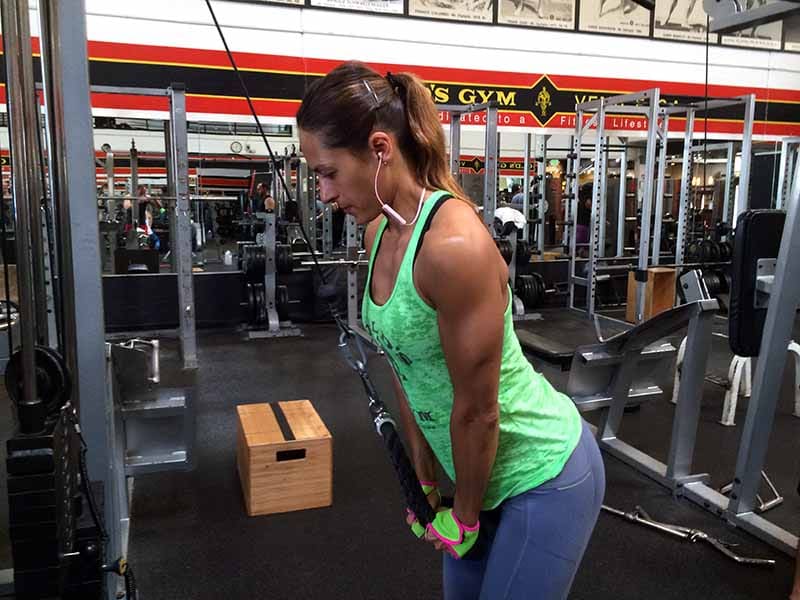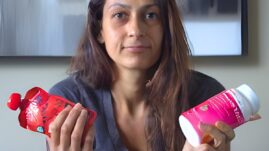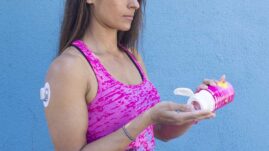If you regularly do cardio (like running, swimming, dancing, etc.), you have probably noticed that your blood sugar reacts differently depending on the type of cardio.
While steady-state cardio will usually make your blood sugar drop, interval training can make it increase (you can read why in this post).
The same goes for resistance training (weight lifting) and blood sugar. Some types of resistance training will make your blood sugars increase!
In this post, I’ll talk about how different types of resistance training affect your blood sugar and the strategies you can try to proactively manage your blood sugar during and after resistance training.
Always discuss changes to your insulin doses with your medical team. Since we’re all a little different, you may need to adjust differently for exercise than I do.

Table of Contents
- Why resistance training is good for people with diabetes
- How high-rep resistance workouts affect my blood sugar
- How low-rep resistance workouts affect my blood sugar
- How to prepare for resistance training and prevent post-workout lows
- How to adjust your insulin up to 36 hours after a resistance workout
- Summary
Why resistance training is good for people with diabetes
I absolutely love resistance training for three reasons:
- Resistance training makes me feel strong and empowered.
- Resistance training has helped me shape my body to my liking.
- Resistance training ultimately makes my diabetes easier to manage, as it improves my body’s ability to utilize insulin.
Resistance training generally falls into two categories
- Low-rep (heavy) training with pauses between each set.
- High-rep training or supersets with little rest between sets. Your heart rate is elevated throughout the workout.
Each type of resistance training will affect my blood sugar a little differently during my workouts but they both have the same long-term benefit of a significantly improved insulin sensitivity.
How high-rep resistance workouts affect my blood sugar
In general, I need to be a little more careful and watch my sugars more closely if I do high-rep workouts, supersets, or a lot of compound leg exercises (like squats, deadlifts, or lunges).
These kinds of workouts will have a cardio-like (aerobic) impact on my blood sugar since my heart rate will be elevated for most of the session and I can expect my blood sugar to drop.
I treat sessions like these almost as I would treat steady-state cardio – by reducing my pre-workout insulin dose by about 30%-50%.
How low-rep resistance workouts affect my blood sugar
When it comes to more traditional resistance training with fewer reps (less than about 12 reps per set), the situation is a little different. When doing workouts like this, I sometimes see my blood sugar go up, and sometimes I don’t see much of an impact at all. It comes down to what body part I’m training.
For smaller muscle groups like arms and shoulders, my heart rate won’t usually increase that much despite the heavy weights, and my blood sugar will remain stable. If I do heavy chest, back, or leg workouts, however, I’ll most likely see an impact on my blood sugar, and it can often be an increase. My body reacts in the same way as when I do an interval cardio workout.
Given this knowledge, I’ll reduce my pre-workout insulin dose minimally or not at all for a low-rep workout, depending on the body parts I am training.

How to prepare for resistance training and prevent post-workout lows
When it comes to resistance training, pre-workout meals play a huge role in whether you’ll be successful in the gym. I always eat something before and after a strength-training workout to ensure I have enough energy to do the workout, rebuild my muscles, and maintain good blood sugar levels.
My pre-workout snack is a fairly low glycemic carb (like brown rice) and some lean protein (like chicken breast) which I eat about an hour before my workout. By eating a low glycemic carb and some protein, I get enough energy for my workout without having to take a lot of insulin.
My post-workout snack consists of a low or high-glycemic carb with an easily digested protein (like fruit and a whey protein shake).
As mentioned, I generally reduce my insulin dose for the pre- and post-workout meals by up to 50%, especially on high-rep and superset days, due to the cardiovascular (aerobic) component of the workout, which always makes my blood sugar drop.
However, taking a bit of insulin before a resistance training workout also has the benefit that it reduces my risk of high blood sugar during the low-rep sessions.
How to adjust your insulin up to 36 hours after a resistance workout
My approach to insulin adjustments for the 24 to 36 hours after I leave the gym is the same no matter what kind of resistance training I’ve done.
What happens when you do resistance training is that you create microscopic tears in your muscle fibers, and for the next 24 to 36 hours, your muscles heal and get bigger and stronger. During this period, your muscles need energy to heal and that has to come from somewhere, so low blood sugars can easily be the result if I don’t plan ahead.
If I do resistance training less than four times per week, I will typically have to reduce my nighttime basal insulin by up to 50% on the days on which I work out (this is different for every individual so you need to experiment and track your results to find what works best for you).
If I do resistance training more than four times per week, the increased insulin sensitivity is present all the time and I can simply lower my nighttime basal permanently without having to adjust for individual workouts.
Note: If you do resistance work to the point of severe or delayed soreness, you can actually increase insulin resistance. If the muscles are being repaired for several days due to extreme damage, you can’t restore glycogen in them until the repair is done, and that causes insulin resistance.
Summary
I find it easier to adjust for resistance training than for cardio, as long as I am very aware of the kind of resistance training I am doing and remember these guidelines:
- High-rep workouts in which your heart rate is elevated will most likely make your blood sugar drop.
- Low-rep workouts that don’t elevate your heart rate significantly (like arms or shoulders) most likely won’t affect your blood sugar.
- Hard low-rep workouts of large muscle groups can affect your blood sugar like an interval workout, potentially leading to an increase in blood sugar.
- Don’t be scared of eating!!! Eat enough lean protein and carbs to fuel your workout, ensure muscle recovery, and (with the appropriate insulin dose) stabilize your blood sugar levels.
- Consider reducing your insulin levels appropriately during the 24 to 36 hours after a workout to adjust for the type of resistance training you’ve done.
Have fun in the gym!





Benson Stallings
Christel i have been type 2 for 10 plus years and struggled on and off with my Bg’s i was a very strong man for many years and have lost alot of weight and muscle mass.
i have start weight training to regain mass and strengh mainly upper body for now and heavy weight less reps, from what i read that could lower by bg levels?
Thoughts?
Christel Oerum
It might increase your blood sugar during but that type of training should help your overall insulin sensitivity and thereby help reduce your blood sugar in the long run
Benson Stallings
Thanks, will the heavy lifting less reps decrease bg levels during muscle repair?
Christel Oerum
The heavier lifting will help you build muscle mass which will increase your insulin sensitivity as well as allow your body to store more glucose rather than just dump it into the bloodstream
Benson Stallings
I’m 54 and lost a ton of mass so i’m hitting weights hard 3 times a week hoping to see some changes, thanks for the wonderful advice!!!
Benson Stallings
Christel i lifted last night and did a BS test before and after and after i lifted hard for 30 minutes my sugar dropped 30 points!
Christel Oerum
That’s a great piece of data. I’d continue to measure after so you can get a feel for what pattern you follow
Benson Stallings
Still lifting and increasing weight, sugars after weight training still drop anywhere from 30 to 50 points, way better than a docs prescription!
Anant
Hi, Thanks for all the info. I am type 1 diabetic since last 22 years. I am 32 years old now and do heavy resistance training till failure with 8-12 reps per set. The problem is that my sugar levels ranges from 200-300 after workout and start to come down in a couple of hours. By that time, I take normal dosage of my pre-dinner insulin and my sugar levels keep normal after that . How to avoid this high BG which happens for a couple of hours or till the time i take my insulin.
Christel Oerum
Sounds like you might benefit from a little more IOB (active insulin onboard) during your workouts. If you eat 1-2 hours before you might consider increasing your bolus for that meal. Since it will be more or less out of your body after 4 hours I see that as the optimal way to reduce the risk of going low after. The other option is to do a small preventive correction 30 min before your workout. That is a little riskier as insulin without food, of course, increases the risk of a hypo.
In the end, you have to find the formula that works for you. I recommend taking detailed noted and make changes accordingly (or bring the data and discuss changes with your doctor)
Anant
Thanks a lot for your response Christel. There aren’t many people around in fitness society to provide accurate and important information like this. Keep lifting and carry on with the good work. Thanks again.
James
Hi there I workout 6 to 7 days a week I do a lot of compound exercises and do cardio 3 days a week been on metformin 3 years twice a day when I wake up sugar is like 140 take my pill I eat subway turkey or ham sandwich then I check sugar before gym it’s like 164 go in gym 1 hour to 1 and half come out sugar is like 130. And in 2 hours around a 100 should I change my eating before I go to gym or eat a post snack ?
Christel Oerum
That sounds like pretty good blood sugars to me. However, if you don’t like the 164 mg/dl reading you could try eating fewer carbohydrates before your workout (like a protein shake, deli meat, eggs, etc.) and move that Subway meal to after your workout when you’re more insulin sensitive.
Stephanie
Hi Christel,
I know it’s been some time since you wrote this article. I have type 1 and started strength training 2 days per week – an hour each time. I do about 20 min of cardio (mainly running) two days per week. My schedule: MTh = strength, WSu = cardio.
Prior to starting, I was already at a healthy weight. I follow a plant-based eating plan majority of the time. My total daily dose of insulin was about 25 units +/- 3 units.
Since strength training, my basal insulin requirements have crept up from about 11 units total to now 14.5 units total. I have also been gaining weight slowly and am now about 2-3 pounds more than before.
I didn’t expect my insulin requirements to increase after starting strength training, but the only thing that’s really changed in the last couple of months is that I am doing that plus an extra day of cardio.
Any insights from your experience?
Thanks so much!
Christel Oerum
I’m so glad you’ve started your new routine! Love it.
To your message, the big question would be why is your weight creeping up. If you just recently started that workout routine, it might be fat gain and the only way you can gain fat is if you’re eating more calories than you’re burning.
Some get more hungry when they start to train and can that way end up gaining fat, not because of the insulin, but because of the extra calories. If you’re eating more you’ll also need more insulin (although basal increase would rather be a reflecting of your fat percentage going up).
I’d suggest you keep an eye on your eating habits. All though it’s healthy, even healthy calories can be in a surplus. Maybe you’ve added an additional shake or two or more PB? Or maybe you haven’t even noticed that you’re eating more. You can try keeping a food journal or being very mindful of your eating habits to figure out where the extra calories have crept in.
Laurie
Hi,
Newly dxd LADA 8 months ago at age 40. I really enjoyed reading your posts. I take 4 units of long acting every morning and I vary a fast acting pen for meals if needed. I find that I can avoid using the meal pen if I keep the carb intake under 20g per meal. I use the pen 1-3 times per week for dinner only if needed. I would like to get back into working out. I’ve tried running and I feel like I can get a handle on the lows.
1) For running/cardio-I could use more ideas on what to eat prior and after. I feel like I was taking in too many calories to lose weight. I have about 10lbs to lose.
2) now that’s its winter, I snowboard. I eat a high carb meal prior to going to the mountain to put me around 200 (such as an egg and cheese sandwich on bread). Then every 30 min I eat those super tiny snickers squares (easy to keep in a pocket). Seems to work.
3) now I am looking to shift to indoor workouts like the 21 day fix. Cardio w daily weight training . Yesterday was day one. My BGs soared to 220 after. I have never experienced this. Then it came down over the next 1.5 hours. Next I ate a chicken Cobb salad for dinner. Then by 8pm my BGs were 60-64. I was shaking like a mummy! Lastly I get like crap for the rest of the night and slept poorly.
Just looking for over all advice on food and control. I do not use any insulin to correct. I also use a freestyle Libre, but I’m currently I. The process of getting a dexcom. I worry about my over night BGs, so praying I will sleep through the night once I get the dexcom.
Thank you in advance.
Christel Oerum
Hi Laurie,
Since you still have an insulin production your lows during the day might be hard to manage without taking in extra carbohydrates. You could try experimenting with moving your basal and take it at night instead, and generally lowering it on days where you are active.
Those days where you’re on the mountain all day (and still take your basal in the morning) you could experiment with reducing your basal. The only reason you go low is that you have too much insulin on board (IOB).
1) Unless you do endurance sport (>60 min) I don’t think there’s a need to fuel for running/cardio. Just eat your meals and if you go low have a fast acting carb like juice/glucose tabs (generally first step is to lower insulin if possible, next is to eat)
2) Seems like a lot of food just to go skiing. If you’re hungry, super, if not see basal idea above
3) Going low is very normal after workouts (up to 24 hours or more) so again you’ll need to lower your insulin (basal included) or eat carbohydrates
I know it’s a lot, but if you’re structured and write things down you will find what works for you
Vikram
My BG rises almost 100pts after heavy strength training (~1 hour). I eat an apple 30mins prior. Should I consider taking a pre-workout bolus? My only concern is that right after I end my workout, my BG drops 100pts back to normal within a half hour, so maybe a preworkout bolus would actually make me go low instead of counteracting the mid-workout high. Thanks!
Christel Oerum
I would not change anything. If your blood sugars come down by themselves you’d most likely get a low blood sugar if you take extra insulin.
Eliot
Thanks for this blog. I’m navigating new waters and looking for all the info I can get. I was diagnosed with T1D at age 41. I won’t go on about my symptoms leading to diagnosis, but I’d been sliding into it for at least a year. Pertinent to this post, I happened to exercise obsessively daily at the gym during my age 40 year, and it’s likely that saved my life, lowering my blood sugar levels just enough. My blood sugar levels (daily and H1AC) were the highest my diagnosing doctor said he’d ever seen, at over 26 mmol/L. I’m an American living in Finland, BTW, so I express blood sugar values in mmol/L.
I’m curious about how to time insulin best to make muscle gains. It seems that for muscle to obtain energy, you’d need to shoot insulin a bit before the workout. I try to take in 2 units after I’ve had a pre-workout meal. and go into the gym at around 10 – 12, and usually leave at a healthy 5-8 depending on what I do (like you said, high rep and leg day can drop BS more dramatically). I’m told to keep my levels between roughly 4.6 – 10.
Question is: does pre-workout insulin matter for gains? Seems it must, but just want to make sure. Before I got on insulin, I lived in a perpetual state of leg cramps for one year, as I lost weight dramatically (230 lbs to 165, I’m 6-4), and my leg muscles withered worse than my upper body for some reason. Running and leg workouts were excruciating, and I could never maintain much less gain muscle on the legs, but I’d push through anyway. Where everything felt bad last year, it all feels pretty good this year. I don’t “feel” a difference between taking or not taking insulin pre-workout or after a post-workout recovery meal/shake, but I’ve put on muscle (and some healthy fat) this year dramatically (back to around 200 lbs). No clue if timing insulin dose has an effect on muscle gain.
Christel Oerum
Hi, glad you got diagnosed! That sounds like a scary situation.
For muscle growth you need to manage your BG (which you are), eat enough and lift heavy. Reason, why you lost muscle, is most likely that your body was starving and eating away at your muscle mass.
Your current strategy of eating and dosing prior to your workout sounds spot on, ending at 5-8 is pretty darn good. I’d just continue down that road and push through. If you find you don’t put on mass try increasing your calories and change up your workout.
Lbby Rome
Always helpful tips – thank you. One question. When you say: “I treat sessions like these almost as I would treat steady-state cardio – by reducing my pre-workout bolus by about 30%-50%.”. As a pump user, would that equate to reducing my basal by that much?
Christel Oerum
Hi Libby,
If 30-50% basal reduction is what works for you for cardio you could definitely try that out for high rep sessions. If you eat before you could also try only to reduce your bolus or omit it completely (depending on the size of the meal of course). I think you might find that your formula for cardio won’t fit 100% so you probably have to do small tweaks.
Nin
Hi, I have found with my pump I reduce the basal by 50 percent if I am doing moderate cardio at least 90mins prior. I often do resistance
Training after and this seem to keeps my blood glucose stable. I then eat a small dinner but find my morning blood sugars can vary considerably so experimenting with the macro ratio to see what works better. I only work out 4 times a week formally. Any tips as to why you think my morning blood sugar can vary so much given my routine is fairly consistent?
Christel Oerum
I’m thinking it could be your macronutrient split. If you have a meal with more fat that will reduce the glucose release and given your sleeping it could slow it down even more. Same thing with carbs, if you “carb-up” before bed your body will have more glucose to release in the AM.
The type of exercise you did the day before can also impact your morning blood sugars. Keep a log, and try experimenting to see what works best for you
Rodney Giles
Thank you so much for the insight!!! You absolutely ROCK! My question is, do I withhold carbs (all) until I get my numbers where they need to be or do I follow the meal plan and let my levels adjust on its own? I’ve started cardio more frequently but I love weight lifting and I’m afraid to lift because of spikes. Will cardio after lifting be the way to go or is that too much stress?
Christel Oerum
If you use insulin I’d suggest you manipulate your IOB (insulin on board) to take care of spikes. You can try walking after, often that will help your blood sugars come down after (that also works if not on insulin).
Generally, I’d suggest eating at least a little before a resistance training workout. If fasting many see the spike increase.
And thank you 🙂
Jason
Hi Christel,
I have a question regarding carb tolerance and the beneficial effects of building muscle. For example, suppose someone has a BMR of 1500 and is somewhat active with a TDEE of 2250. Let’s assume that this person can eat a maximum of about 200g of carbs (from a combination of high and low GI sources) a day for good daily blood sugar control and favorable triglyceride, A1C, etc. markers.
Now suppose this person builds about 4 pounds of muscle with 4 pounds of fat. Since a pound of muscle burns ~6 calories at rest and fat ~2, that would push the BMR to ~1530 with a TDEE around 2300.
Do you think it sounds reasonable that the daily protein requirement might increase by roughly 2-3 grams (so about 10 of the extra 50 calories)? If that is the case, that would mean about 40 extra calories for fat and carbs. Is it fair to say that this could be split about equally? So in this case, with 20 calories leftover for carbs, that means this person would have their carb tolerance increased by only about 5g a day? Just wondering if this is a somewhat accurately way of looking at the situation or if it’s more complicated than this.
I know the situation changes if other factors such as carb sources and stress are put into the mix, but in this scenario it would be assuming all of these other factors remain the same. I was also thinking that it could be hard to tell since resistance training can increase insulin sensitivity without gaining much actual muscle. So I guess it also comes down to how much actual glycogen storage is available.
Thanks,
Jason
Christel Oerum
I’m not sure. Generally, I’d say that 40 calories / 5 g of carbs are so small numbers that they aren’t worth spending a lot of time thinking about.
And other factors play in as well like glycogen storage, hormones, eating schedule etc. so basically I don’t think I can give you a meaningful answer